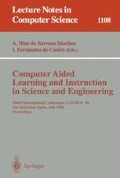Abstract
The autonomous agent approach to CAL is proposed and discuss in the paper. The approach is invented for the category of problems arises when a group of human beings exists and their activities influence each other in the course of realization of a some common goal. It is assumed that the activities are partially taken over by computer agents. The agents act intelligently to fulfill some partial goals of their masters preserving their autonomy. They can serve other agents with information.
Application of an autonomous agent as an interlocutor of each student and an assistant to the teacher armed with exchange information means not only sustaining individualization of the learning process but enriches it with the social aspect also.
Basic issues about the Decentralized Computer Learning System are also presented.
Preview
Unable to display preview. Download preview PDF.
References
Breza, J., Donoval, D., and Redhammer, R., editors. Proc. 3rd Int. Conf. on Comp. Aided Engineering Education, Bratislava, Slovak Rep., 1995. Slovak Technical Univ.
Cetnarowicz, K., Marcjan, R., Nawarecki, E., and Zygmunt, M. Intelligent tutorial and diagnostic system. In Attia, F. et al., editors, EXPERSYS-92, Technology Transfer Series, pages 103–108, Gourmay sur Marne, France, 1992. IITT-International. ISBN 2-907669-25-7.
Delafontaine, G. and Warkentyne, K. Preparing hypertext-based courseware for world wide web. In Breza et al.
Demazeau, Y. and Müller, J.-P. Decentralized artificial intelligence. In Demazeau, Y. and Müller, J.-P., editors, Decentralized A.I., pages 3–14. North-Holland, 1990. ISBN 0-444-88705-9.
Dobrowolski, G., Koźlak, J., and Nawrot, J. Simulation testing of decentralized teaching support system. In Štefan, J., editor, Advanced Simulation of Systems, volume 2, pages 81–88, Ostrava, 1995. MARQ. ISBN 80-901751-4-7.
Heiß, F. New windows-based tutorial software system. In Breza et al. [1], pages 17–21.
Kalboussi, F. and Skhiri, Z. Multimedia environment for computer aided learning systems (CAL). In Bubnicki, Z., editor, Proc. of the 12th Int. Conf. on Systems Science, volume 3, pages 64–68, Wrocław, Poland, 1995. Oficyna Wydawnicza Politechniki Wrocławskiej. ISBN 83-7085-152-5.
Pudlowski, Z. An overview of research and development activities in computerassisted electrical engineering education. In Breza et al. [1], pages 83–88.
Author information
Authors and Affiliations
Editor information
Rights and permissions
Copyright information
© 1996 Springer-Verlag Berlin Heidelberg
About this paper
Cite this paper
Nawarecki, E., Dobrowolski, G. (1996). Decentralized computer learning systems based on autonomous agent approach. In: Díaz de Ilarraza Sánchez, A., Fernández de Castro, I. (eds) Computer Aided Learning and Instruction in Science and Engineering. CALISCE 1996. Lecture Notes in Computer Science, vol 1108. Springer, Berlin, Heidelberg. https://doi.org/10.1007/BFb0022597
Download citation
DOI: https://doi.org/10.1007/BFb0022597
Published:
Publisher Name: Springer, Berlin, Heidelberg
Print ISBN: 978-3-540-61491-3
Online ISBN: 978-3-540-68675-0
eBook Packages: Springer Book Archive

